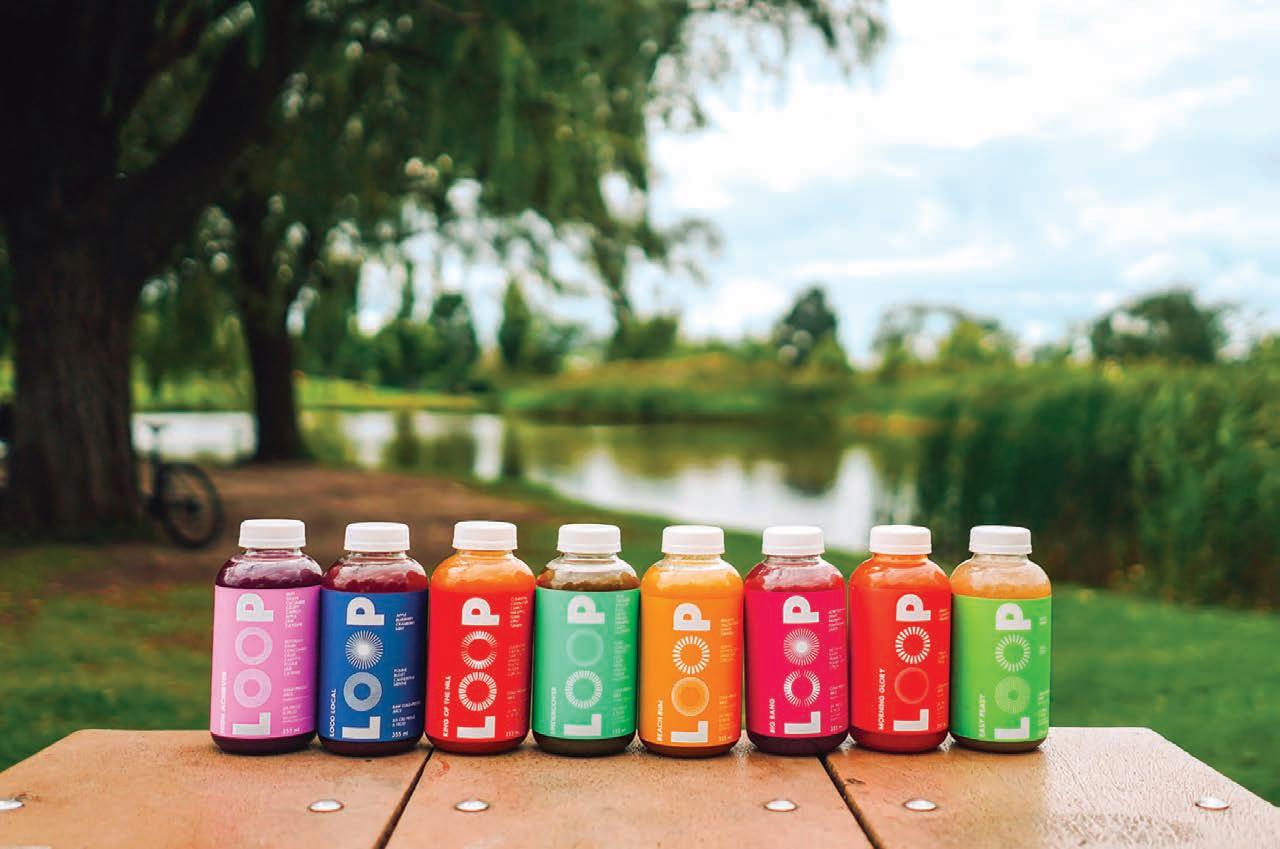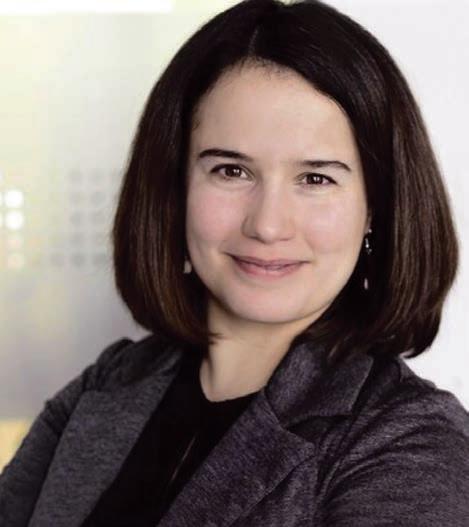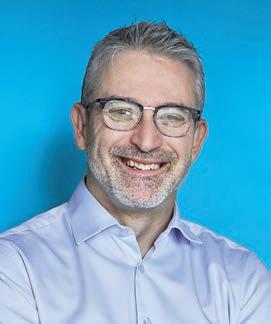
8 minute read
CIRCULAR ECONOMY The Circular Economy, or the right way to be Going in Circles
THE CIRCULAR ECONOMY, OR THE RIGHT WAY TO BE GOING IN CIRCLES
BY PIERRE THÉROUX, JOURNALIST
It all started with a simple phone call
espite efforts to reduce waste, the major fruit and vegetable importer and distributor Courchesne Larose was sending no less than 16 tonnes of substandard looking products to landfill sites for industrial waste, every day. Looking for solutions to reduce its losses and the high cost of waste removal service, the D firm spoke to David Côté, the founder of the vegetarian restaurant Crudessence and the firm Rise Kombucha. Thus was born Loop, a company that since 2016 has specialized in the production of cold-pressed juices from fruits and vegetables downgraded by the food industry. "Five years ago there was little talk of the circular economy. Now it’s on everyone’s lips, and this is just the beginning," said David Côté, a co-founder of Loop.

Basically, the circular economy aims to make better use of goods or services at all stages of their life cycle, insisting on their re-use. It thus goes against the current linear model. Traditionally we extract, we produce, we distribute, we consume... and then we throw away.
DAVID CÔTÉ
Founder Crudessence and Rise Kombucha Co-founder Loop
LOOP
But there is still a long way to go. Although Montréal is well positioned compared to other major Canadian and North American cities, it lags behind European cities which are leaders in this area, stated the Conseil jeunesse de Montréal in its Avis sur l’économie circulaire presented in autumn 2019.
A year ago, for example, the city of Amsterdam adopted an ambitious action plan to have a completely circular economy by 2050. Greater Paris has made it a priority axis of its economic development plan, and the deputy mayor of Paris is responsible for all matters related to the social and circular economy.

PROLIFERATION OF PROJECTS
There are now all sorts of initiatives for developing the circular economy in Montréal, notes Melissa Stoia, director of sustainable development and the circular economy at the business support network PME MTL Est-de-l’Île. "We’re seeing more and more startups adopting circular economy principles as a business model, and there is also more excitement from existing businesses. We’re starting to reach a critical mass in favour of a rollout on a larger scale," said the director, who is also in charge of coordinating the Synergie Montréal initiative, launched in 2016 to facilitate symbiosis among companies to push this new economy further.
The tool sharing co-op La Remise in the Villeray neighbourhood and the computer repair service Insertech in Rosemont are two of the 300 or so circular economy initiatives registered in Montréal. Another of note is the car sharing service Solon for residents in certain sectors of the Rosemont and La Petite Patrie neighbourhoods.
Two-thirds of these projects are run mainly by social economy associations, non-profit organizations and cooperatives (41%), municipal organizations (19%) or are initiatives launched by citizens, collectives or institutions (5%). Only one-third (35%) were initiated by companies, industries or businesses, such as the Les 3 brasseurs chain of restaurants which offers its brewing yeast sediment to TriCycle, a company that uses food waste and organic materials from agri-food firms in the Montréal region to produce edible insects such as crickets!

BUSINESS NEEDS TO STEP UP
It’s time now for businesses "to play a leading role in shifting from a linear economy to a circular economy. That’s where they’ll make a bigger impact," notes Daniel Normandin, director of the Centre for Intersectoral Studies and Research on the Circular Economy (CERIEC), launched last fall by the École de technologie supérieure (ÉTS). This new centre is pursuing the work of the EDDEC Institute, affiliated with the University of Montréal. Also directed by Daniel Normandin, it completed its studies of the circular economy in 2020 after five years of existence.
PME MTL EST-DE-L’ILE
MELISSA STOIA
Director of sustainable development and the circular economy PME MTL Est-de-l’Île
DANIEL NORMANDIN
Director Centre for Intersectoral Studies and Research on the Circular Economy (CERIEC)
CERIEC
Thanks to a $2 million donation from Mouvement Desjardins, CERIEC intends to set up an ecosystem of eight circular economy acceleration laboratories. The first Living Lab will focus on managing waste from construction, renovation and demolition, a recurring problem for municipalities.
"In all big cities, it is the construction sector that consumes the most resources. It is also a major generator of waste," said Daniel Normandin, adding that CERIEC is also interested in the agri-food and electronics sectors. "The objective is to win over key players in these industries to identify obstacles to the circularity of certain products, and to work with them to come up with solutions together."

Large cities are at the forefront of the transition to a circular economy. They are now home to more than half of the world’s population, consume approximately 75% of natural resources and generate from 60 to 80% of greenhouse gas emissions. It is a pressing issue. "It is in cities, with their high densities of people and industries, where both problems and solutions are to be found. For if we don’t change our current model of economic development, we’re heading straight for disaster," added Daniel Normandin.
$30 MILLION FUND
In that regard, Mr. Normadin is delighted with the launch in March of the Circular Economy Fund by Fondaction, in conjunction with its partners RECYC-QUÉBEC and the City of Montréal. "That will help companies make the shift toward a more circular economy." This new $30 million investment fund, the first of its kind in Canada, will target chiefly the agri-food, recycling and resource recovery, and eco-construction sectors.

JULIE POITRAS-SAULNIER
Co-founder and president Loop
LOOP
CERIEC and the ÉTS are also advocating to include classes on the circular economy in training programs for engineers and managers who, once they enter the job market or launch their own firms, will be in a position to promote and implement circular economy strategies. In fact, a generational changing of the guard is already being felt, notes Melissa Stoia. "Young people want to work for organizations that will have a positive impact on the environment."
In the meantime, Loop is multiplying its activities. In addition to its cold-pressed juices, the young company has started making fruity beers from bread recovered from bakeries, as well as gin made from potato scraps provided by the potato chip producer YumYum. "Every week we receive calls from companies looking for ways to recover value from surpluses or substandard products that are rejected," said Julie Poitras-Saulnier, co-founder and president of Loop, who is also working on developing a line of cosmetics made from waste coffee grounds.
There is no doubt that the expression "Nothing is lost, nothing is created, everything is transformed", coined by the French chemist Lavoisier in the late 1700s, now resonates with new meaning.
Société de transport de Montréal
KEY PLAYER IN THE ECONOMIC RECOVERY
With an investment plan of $18G over the next 10 years, the Société de transport de Montréal (STM) is firmly committed to playing an active role in the economic recovery of the city and Québec as a whole.

LUC TREMBLAY
General manager Société de transport de Montréal
ecause of the pandemic the STM has experienced a significant drop in ridership. "We are currently moving about 450,000 people per day compared to 1.5 million daily trips before COVID-19," said Luc Tremblay, the transit authority’s general manager. That has not put a stop to its investment projects, however. "We are one of the largest employer in the city," B AN ELECTRIC FLEET Over the past three years the STM has increased its fleet of vehicles by 15% with the addition of some 300 hybrid buses. The transit authority is also making the shift to electrification. "By 2025 we will be purchasing only electric buses. That will mean adapting our transportation centres and installing charging stations. In addition, we need to build two he added. With more than 11,000 workers, the STM new centres." is the 13th biggest employer in Québec. It has an annual budget of $3G, half of which is set aside for Seven fast-charging electric buses are currently on its infrastructure projects. the streets of Montréal, and trials are underway with slow-charging electric buses. "The #36 Monk Faced with aging facilities, a few years ago it line, which connects downtown to the Angrignon launched a vast project to renovate its bus and metro terminus, was the first completely electrified bus infrastructure, which will continue until 2025. "At the route in North America. To achieve that goal we had moment, we have about 100 construction projects to validate several elements, including testing the underway," said Mr. Tremblay. "We are also pursuing capacity of batteries over long distances. We now our Accessibility program, which will eventually see know that the technology is reliable even in winter." the installation of elevators in our 68 metro stations. Currently some twenty stations are equipped with RENOWNED EXPERTISE them, and there will soon be fifteen more." The STM has embarked on another key structuring project: the extension of the Blue line of the metro, The STM has also replaced the MR-63 models with which includes the addition of five new stations Azur trains built by Bombardier-Alstom, a colossal serving the east end of Montréal. This investment project that required an investment of more than of several billion dollars is part of its Public Transit $2G. It has begun a second phase of acquiring 17 Strategic Development Plan, and the STM is responsible more trains. "We’ve already received about 60 new for its construction. "It’s a first for us," explained Luc ones, and 10 more will be coming in 2021," he noted. Tremblay. "In the history of the metro we have never been responsible for building a new metro extension. We are very pleased, because it means that our expertise is recognized and appreciated." Given all these projects, the STM generates many jobs in the Montréal region and elsewhere in Québec. With the end of the pandemic on the near horizon, it is looking forward to a return to its pre-pandemic ridership. "Once business activity resumes, we’ll be able to participate in the city’s economic recovery." n






